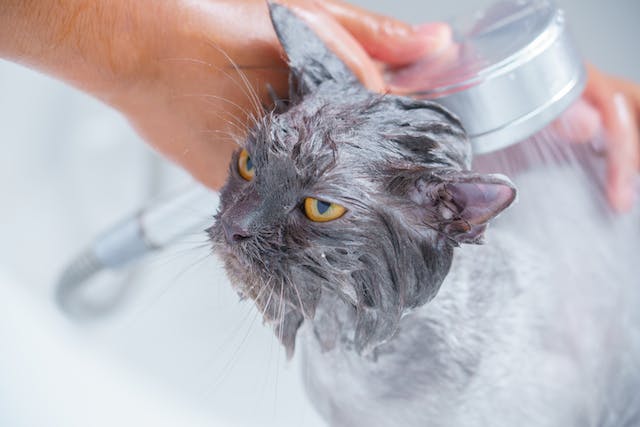Just like humans, our furry companions, dogs, and cats, are susceptible to skin allergies that can cause discomfort and irritation. These allergies often manifest through various symptoms, signaling distress to our pets. As devoted pet parents, it’s crucial to be vigilant and observant, recognizing telltale signs such as itching, redness, rashes, or skin infections that might indicate an allergic reaction. Understanding these symptoms enables us to seek timely veterinary care and adopt preventive measures to ensure our beloved companions lead healthy and comfortable lives.
Skin allergies in dogs and cats can arise from various sources:
• Flea Allergy Dermatitis (FAD): Flea allergies occur when pets are hypersensitive to flea saliva, resulting in intense itching, redness, and skin irritation, particularly around the tail base or back of the thighs. Even a single flea bite can trigger intense itching and skin irritation.
• Food allergies, while less common, can provoke skin reactions such as itching, rashes, and gastrointestinal issues. Certain ingredients in pet food, such as beef, chicken, wheat, soy, or dairy, can provoke allergic reactions in some animals, leading to skin issues.
• Environmental allergies, including pollen, mold, dust mites, or certain chemicals, can trigger allergic reactions leading to symptoms like itching, inflamed skin, and sometimes secondary infections.

• Atopic Dermatitis: Similar to human eczema, atopic dermatitis in pets is often triggered by environmental allergens like pollen, mold, dust mites, or even certain fabrics.
• Contact Dermatitis: Some pets are sensitive to certain substances they come into direct contact with, such as certain shampoos, household cleaners, or plants.
• Bacterial or Yeast Infections: While not allergies per se, pets with underlying allergies are more susceptible to secondary skin infections caused by bacteria or yeast due to their weakened skin barrier from constant scratching.
Identifying the specific allergen causing the reaction can be challenging and often requires the expertise of a veterinarian. Treatments may involve allergen avoidance, medications to manage symptoms, special diets, or immunotherapy.
Certain dog breeds like Labrador Retrievers, Golden Retrievers, Bulldogs, and Boxers are more prone to skin allergies. Breeds like Siamese and Sphynx cats are also known to have higher incidences of skin issues. The reasons behind these allergies can be multifaceted, ranging from genetic predispositions to environmental factors. Genetic factors can contribute to a weakened skin barrier, making pets more susceptible to allergens, while environmental triggers, such as pollen or dust, can cause immune system overreactions in sensitive animals.
Alleviating your pet’s skin allergies involves a combination of proactive measures and veterinary guidance. Here are some tips to help:
Regular Veterinary Check-Ups: Schedule routine check-ups to monitor your pet’s skin health and discuss any concerns with your vet. They can provide specific advice tailored to your pet’s needs.
Quality Nutrition: Ensure your pet follows a balanced diet suitable for their age, breed, and any known allergies. High-quality, hypoallergenic foods or specialized diets recommended by your vet can aid in managing food-related allergies.
Flea Control: Employ year-round flea prevention measures. Regular grooming and flea treatments can significantly reduce allergic reactions caused by flea bites.
Allergen Management: Minimize exposure to environmental allergens by cleaning your home regularly, using air purifiers, and washing pet bedding frequently. Limit outdoor time during high pollen seasons.
Gentle Bathing and Grooming: Use mild, pet-specific shampoos recommended by your vet and bathe your pet regularly to remove allergens and soothe irritated skin. Be cautious not to over-bathe, as it can dry out their skin. If you would like professional grooming, Collar Cuts comes straight to your home. We have several add-ons to our brush and bath service you’ll love, like our Oatmeal Baking Soda Shampoo. It contains oatmeal to soothe dry, itchy skin, baking soda to neutralize odors, and aloe vera to condition your pet’s skin and coat.

Environmental Adaptations: Consider your pet’s surroundings. Avoid harsh chemicals or strong scents that might trigger allergies. Opt for pet-friendly products and detergents.
Stress Management: Minimize stressors as anxiety can exacerbate skin conditions. Provide a calm and comforting environment for your pet.
Medication and Treatments: Follow your vet’s prescribed medications, which might include flea prevention, antihistamines, steroids, or immunotherapy. These treatments can help manage symptoms effectively.
Supplements: Explore supplements like omega-3 fatty acids, which can aid in skin health and alleviate inflammation.
Remember, every pet is unique, so it’s essential to work closely with your veterinarian to create a tailored plan that addresses your pet’s specific allergies and needs.
Sources:
isvma.org
vcahospitals.com
Openai.com

